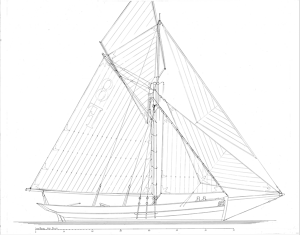
 Based at the Rhoda Mary Shipyard on the bank of the Truro river where so many fine wooden sailing ships were built, The Falmouth Pilot Cutter CIC has recreated a traditional environment where we hope many projects of historic maritime importance will take place.
Based at the Rhoda Mary Shipyard on the bank of the Truro river where so many fine wooden sailing ships were built, The Falmouth Pilot Cutter CIC has recreated a traditional environment where we hope many projects of historic maritime importance will take place.
The Falmouth Pilot Cutter CIC plans to nurture and train young people in the art of shipbuilding, and create a new generation with skills and knowledge of the seas. Once launched, the Pellew will remain based in Truro and sail the seas giving opportunities for apprenticeships in the traditional trades and seamanship associated with such a vessel.
[/et_pb_text][/et_pb_column]
[/et_pb_row]
[/et_pb_section]

 For many years there has been a desire to resurrect a legendary Falmouth Pilot cutter; and rekindle wooden shipbuilding in Cornwall. We have chosen to faithfully recreate
For many years there has been a desire to resurrect a legendary Falmouth Pilot cutter; and rekindle wooden shipbuilding in Cornwall. We have chosen to faithfully recreate Cornish pilots developed their profession to a high standard. With a good cutter they could earn well, but if their vessel was slow, there were no wages; only the best survived. This demand created a most beautiful vessel, fit for purpose, fast to compete with the other cutters and yet seaworthy to survive the harsh conditions. The Cutters would sail west into the Atlantic beyond the Isles of Scilly in search of ships. Each carried eight pilots. They would return to port only after all pilots were placed. At times, if a further sail was sighted, the skipper of the cutter would also ship off as a pilot, leaving just the boy to sail the large pilot cutter home.
Cornish pilots developed their profession to a high standard. With a good cutter they could earn well, but if their vessel was slow, there were no wages; only the best survived. This demand created a most beautiful vessel, fit for purpose, fast to compete with the other cutters and yet seaworthy to survive the harsh conditions. The Cutters would sail west into the Atlantic beyond the Isles of Scilly in search of ships. Each carried eight pilots. They would return to port only after all pilots were placed. At times, if a further sail was sighted, the skipper of the cutter would also ship off as a pilot, leaving just the boy to sail the large pilot cutter home. Ships sailing in from the Atlantic heading towards the rocky coasts of Cornwall had rudimentary navigation, giving them only a rough idea of their position. Seeking a safe haven, they eagerly sought local maritime knowledge. In all weathers Cornish folk would put to sea in their cutters to find incoming ships to put a man aboard. Over the centuries Cornish cutters were made to perfection, developed to survive and sail in some of the wildest conditions in the seafaring world.
Ships sailing in from the Atlantic heading towards the rocky coasts of Cornwall had rudimentary navigation, giving them only a rough idea of their position. Seeking a safe haven, they eagerly sought local maritime knowledge. In all weathers Cornish folk would put to sea in their cutters to find incoming ships to put a man aboard. Over the centuries Cornish cutters were made to perfection, developed to survive and sail in some of the wildest conditions in the seafaring world. 